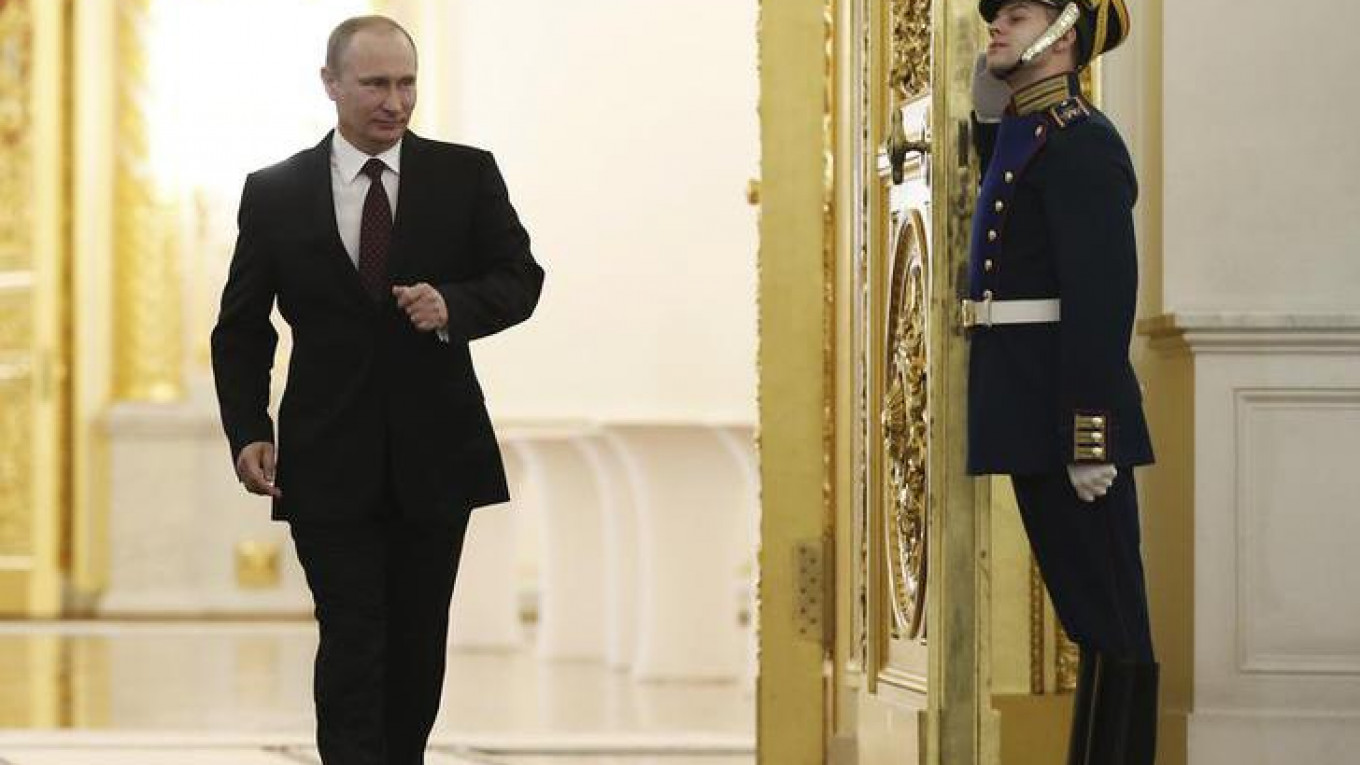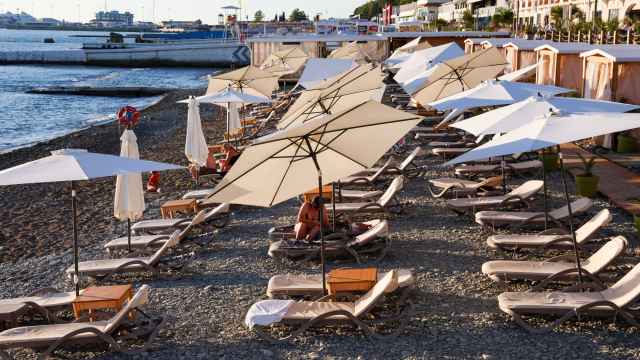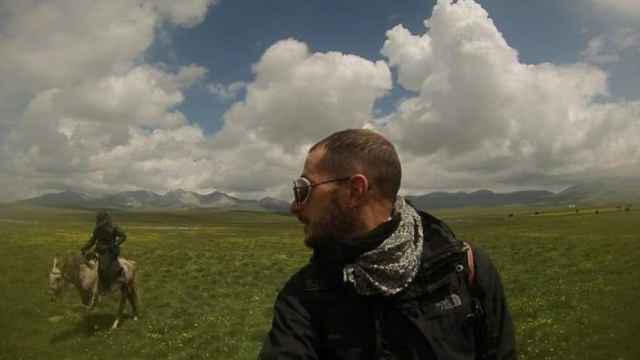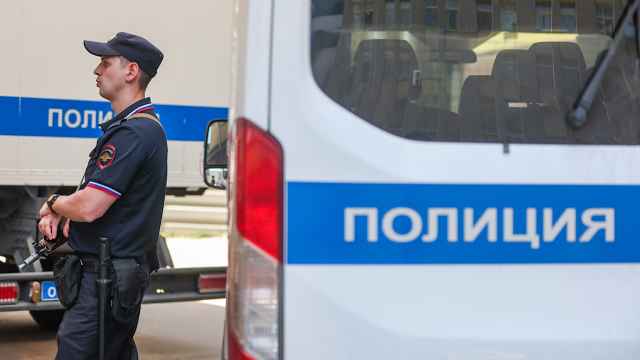Alexei Ulyukayev, the former economic development minister, booked his place in modern Russian history with his arrest the night of Nov. 14.
The day after Ulyukayev was detained, police charged him with extorting a $2-million bribe from oil giant Rosneft. Authorities say the deal was in exchange for a “positive assessment” on Rosneft’s bid to purchase half of Bashneft, another recently nationalized oil company. The minister, whom Vladimir Putin quickly fired, was placed under house arrest, and now awaits trial.
At his arraignment hearing, Ulyukayev described himself as a “victim of provocation.” And he wasn’t lying. Ulyukayev now saw the bigger picture, and he understood that he’d been set up. He was also suddenly aware that he was in deep trouble.
Read more: The Ulyukayev Case: What is the Ruling Elite so Afraid Of?
“The evidence [against him] is huge,” a high-level source within Russia’s ruling establishment told The Moscow Times.
Police arrested Ulyukayev late on Nov. 14 as he left Rosneft’s offices in Moscow. According to a report by Rosbalt news agency, Rosneft CEO Igor Sechin had invited the minister for a private chat.
“It makes sense,” a state official told The Moscow Times. “Otherwise [Ulyukayev] would never have dared going there and taking the cash.”
Any federal minister knows how the system works. The decision to arrest Alexei Ulyukayev could only have come from the very top of Federal Security Service, and with Vladimir Putin’s direct approval.
The Kremlin has scarcely denied its role in the case. Putin’s spokesperson, Dmitry Peskov, told reporters that the president was aware “from the very start of the investigative operations.”
To put it bluntly, Vladimir Putin orchestrated the arrest of his own minister.
But why?
Revising the Rules
With Russia’s next presidential election slightly more than a year away, Vladimir Putin will have to make clear at some point in the next several months whether he intends to stay or go. If he chooses another six-year term in office, he’ll be on track to remain in power for 23 years — the longest any Russian leader has reigned since Stalin.
Until recently, Vladimir Putin almost constantly reinvented the nature of his presidency.
He started out as Boris Yeltsin’s successor in 2000, still surrounded by the vibes and personalities of Russia’s revolution in the early 1990s.
From there, Putin advanced as a self-made hardliner, and three years later he administered a crackdown that put the Russian political system under the control of the Kremlin and his long-time friends and allies, mostly from special forces.
Read more: Ulyukayev's Arrest Is a Tectonic Convulsion for the Russian Government
Next, he stepped behind the curtain, promoting Dmitry Medvedev to the presidency, and raising hopes that Russia could overcome its history and observe a constitutional succession of power.
In 2012, however, Putin returned, amid street protests in Moscow and other major cities, unlike anything seen in Russia since the 1990s.
By 2016, after squashing most public discontent and restoring his status as Russia’s unique and only ruler, Vladimir Putin set about revising his presidency, once again. This time, the country’s “managed democracy,” popularized a decade ago, would finally give way to open authoritarianism. The Kremlin and the Russian government now resemble an old-world royal court, more than a modern state.
“Individual rule is a trend,” says Valery Solovey, a prominent historian and political analyst in Russia. “But Putin will not be able to avoid collective leadership entirely. Rather, he relies on different groups of confidants regarding different questions.”
The New Guard
Evgeny Zinichev, 50, spent most of his career as an officer in Russia’s Federal Security Guard Service, guarding the country’s top officials. For four years, during the Medvedev presidency, Zinichev was a member of Putin’s personal escort.
It seemed natural this July, when Putin appointed Zinichev to serve as the acting governor of Kaliningrad, Russia’s European exclave. By that time, Zinichev wasn’t even the first bodyguard Putin promoted to work as a governor — that honor belongs to Alexei Dyumin, the acting head of the Tula region.
The surprise came two months later, when Zinichev suddenly resigned. Putin said he asked to return to Moscow for family reasons, but the elite didn’t believe him.
“Everything was fine,” Solomon Ginzburg, a Kaliningrad politician, told The Moscow Times. “The truth is that Zinichev hates publicity. He couldn’t stand his new job.”
Unable to cope with his new position, Zinichev found the courage to ask Putin for another assignment, a government source confirmed to The Moscow Times. Since coming back to Moscow, he’s reportedly accepted a role in the Federal Security Service as a deputy director.
Read more: Why Putin fired his chief of stuff and long-time ally
Analysts seem to agree that both Dyumin and Zinichev have great perspectives in near-term. As Putin has started replacing his old guard with younger loyalists, both men are considered to be top candidates to lead Russia’s flagship defense and security forces.
Burdened with their own interests and connections, Putin’s older associates are being pushed out, in favor of ostensibly more neutral, non-ambitious executives who see the president as a boss, not a comrade.
Enter Anton Vaino, the president’s new chief of staff, who replaced Sergei Ivanov, Putin’s long-time ally. And meet Viktor Zolotov, the former chief of Putin’s security, who now heads Russia’s newly formed, wildly powerful National Guard.
The logic of this process is clear, a Kremlin insider told The Moscow Times: Vladimir Putin is building a system that gives him enough room to maneuver. He wants to ensure that the state will remain loyal to him, no matter what he does — even if he decides to leave office. Putin is remodeling the institutional power of Russia’s presidency into a force under his personal control.
The Loyalty of Fear
Just as he’s made himself essential to Russian politics, Vladimir Putin is involved in many of the country’s major business deals.
After the Swiss commodity trading firm Glencore and the sovereign wealth fund of Qatar acquired nearly 20 percent of Rosneft this month, the company’s CEO, Igor Sechin, thanked Putin for his personal contribution to the deal.
Read more: In Name Alone: Russia’s Fake Privatization
With his passion for entrepreneurship and backroom deals, the president sets an example among the ruling elite in Russia, where it’s already hard to separate government from private business, and where wealth and bureaucratic status go hand in hand. Almost every high-level Russian official is an experienced entrepreneur — in a country where it’s nearly impossible to run a business without breaking the law.
Of this group, an unlucky few land in trouble, often the victims of others’ conflicts behind closed doors. And Vladimir Putin encourages the hunt.
In 2016, Putin’s fight against corruption reached its highest point, with photos and videos of captured officials posed with rolls of illicit cash becoming a law-enforcement trademark. Nearly every area of public service has been hit: a governor, a deputy minister, high-ranking law enforcement officers, and others.
“When enforcing loyalty within the elite, Putin uses both tools: promotion, as well as fear,” says Solovey. “With Ulyukayev’s arrest, his policy of selective repressions reaches its climax.”
Alexei Ulyukayev was simply weak enough to serve as the fall guy, another Kremlin insider told The Moscow Times. His ministry, which specializes in producing economic forecasts and promoting economic growth, wields relatively little authority. And Ulyukayev is not particularly well connected, making him the perfect target.
In 2003, the Kremlin orchestrated the arrest of Mikhail Khodorkovsky, the head of the private oil behemoth Yukos. That event sent shockwaves through Russia’s business community, “curing” entrepreneurs of political ambitions, and marking a global turn in Putin’s presidency.
As Solovey has put it, “What the Yukos case was for Russia’s business, Ulyukayev’s case is for Russia’s bureaucracy.”
A Message from The Moscow Times:
Dear readers,
We are facing unprecedented challenges. Russia's Prosecutor General's Office has designated The Moscow Times as an "undesirable" organization, criminalizing our work and putting our staff at risk of prosecution. This follows our earlier unjust labeling as a "foreign agent."
These actions are direct attempts to silence independent journalism in Russia. The authorities claim our work "discredits the decisions of the Russian leadership." We see things differently: we strive to provide accurate, unbiased reporting on Russia.
We, the journalists of The Moscow Times, refuse to be silenced. But to continue our work, we need your help.
Your support, no matter how small, makes a world of difference. If you can, please support us monthly starting from just $2. It's quick to set up, and every contribution makes a significant impact.
By supporting The Moscow Times, you're defending open, independent journalism in the face of repression. Thank you for standing with us.
Remind me later.







